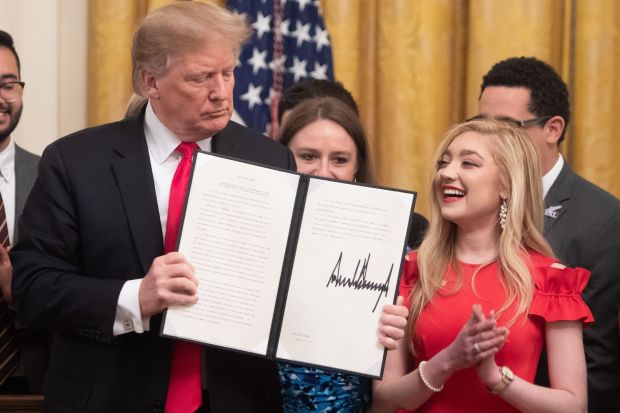On Thursday, President Donald Trump signed an executive order to enforce free speech on college campuses across the country.
The order allows 12 federal agencies to withhold federal research or education grants, excluding federal student aid funding, from colleges that practice censorship.
“Today’s action is just the beginning of our efforts to protect free speech and advance our students’ rights agenda,” Trump said in a speech before signing the order.
“Under the policy I am announcing today, federal agencies will use their authority under various grant-making programs to ensure that public universities protect, cherish — protect the First Amendment and First Amendment rights of their students, or risk losing billions and billions of dollars of federal taxpayer dollars.”
Trump promised the executive action earlier this month during a speech at the Conservative Political Action Conference in National Harbor, Maryland. The proposal was quickly condemned by 14 different organizations across the country who termed the move as a “dangerous solution” to a problem that is largely “nonexistent.”
University of Chicago president Robert J. Zimmer was among those who openly opposed the order, claiming it could make things worse for colleges by restricting the environments in which intellectual discourse and challenge can occur.
Campus free speech has been a raging debate recently, particularly among conservatives who feel their viewpoints continue to be shot down.
Just last month, Hayden William, a Turning Point USA volunteer, was assaulted at the University of California-Berkeley while recruiting new members for the conservative student group.
Critics of the order worry that the move could “discredit” the higher education system and undermine the public trust.
“Like the president’s attacks on other perceived enemies, whether they be journalists, scientists, or academic institutions, and like other attacks on higher education spearheaded by far right-wing organizations like Turning Point USA, the order seems largely designed to undermine the public trust,” Julie Schmid, executive director of the American Association of University Professors said.
The American Federation of Teachers also criticized the order, classifying it as a “political agenda” and castigating Trump for setting a dangerous precedent of taking “punitive action” against colleges.
“There is no reason to believe that the speech he wants to ‘protect’ on college campuses won’t both suppress speech and enable incitement,” AFT president Randi Weingarten said in a statement.
“If the framers of the Constitution were alive today, they would tell President Trump: ‘No, no, no, sir. You can’t use executive orders to suppress the speech of those with whom you disagree’,” Weingarten added.

